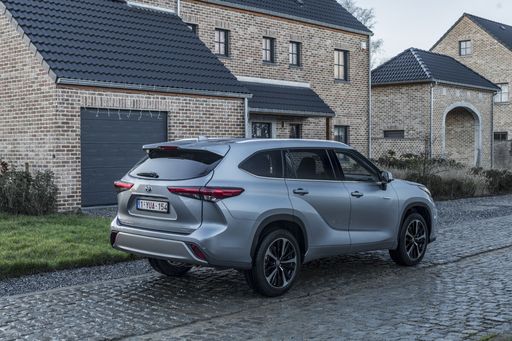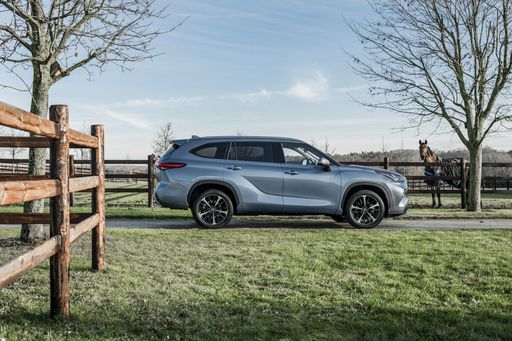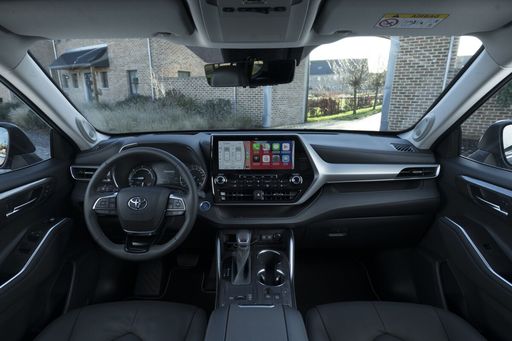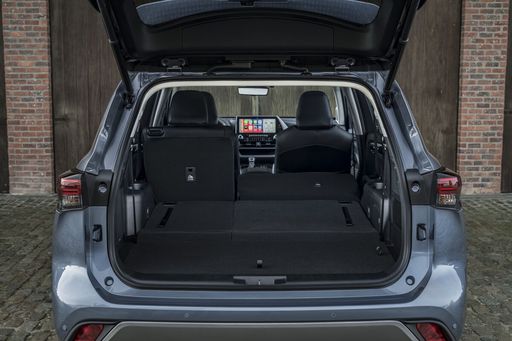Citroen Jumper vs Toyota Highlander – Differences & prices compared
Compare performance, boot space, consumption and price in one view.
Find out now: which car is the better choice for you – Citroen Jumper or Toyota Highlander?
The Citroen Jumper (Cargo Van) comes with a Electric or Diesel engine and Automatic or Manuel transmission. In comparison, the Toyota Highlander () features a engine with transmission.
When it comes to boot capacity, the Citroen Jumper offers , while the Toyota Highlander provides – depending on how much space you need. If you’re looking for more power, decide whether the 279 HP of the Citroen Jumper or the of the Toyota Highlander suits your needs better.
In terms of consumption, the values are 26.20 kWh7.50 L per 100 km for the Citroen Jumper, and for the Toyota Highlander.
Price-wise, the Citroen Jumper starts at 34200 £, while the Toyota Highlander is available from . Compare all the details and find out which model fits your lifestyle best!
Citroen Jumper
The Citroen Jumper impresses with its robust design and exceptional versatility, making it a popular choice for both business and leisure purposes. Its spacious interior is thoughtfully designed to maximise comfort and practicality, providing ample room for passengers and cargo alike. With a smooth driving experience and a range of advanced safety features, the Jumper is well-equipped to handle the demands of modern motoring.
detailsToyota Highlander
The Toyota Highlander is a versatile SUV that seamlessly blends comfort and practicality, making it an ideal choice for families and adventurers alike. With its spacious interior and a clever layout, it offers ample room for passengers and luggage, ensuring every journey is a comfortable experience. Its sophisticated design is complemented by advanced technology features, enhancing both connectivity and safety on the road.
details @ Toyota
@ Toyota
 @ Toyota
@ Toyota
 @ Toyota
@ Toyota
 @ Toyota
@ Toyota
 @ Toyota
@ Toyota

|
|
|
|
|
Costs and Consumption |
|
|---|---|
|
Price
34200 - 57800 £
|
Price
-
|
|
Consumption L/100km
7.5 - 9 L
|
Consumption L/100km
-
|
|
Consumption kWh/100km
26.20 kWh
|
Consumption kWh/100km
-
|
|
Electric Range
424 km
|
Electric Range
-
|
|
Battery Capacity
97.80 kWh
|
Battery Capacity
-
|
|
co2
0 - 233 g/km
|
co2
-
|
|
Fuel tank capacity
90 L
|
Fuel tank capacity
-
|
Dimensions and Body |
|
|---|---|
|
Body Type
Cargo Van
|
Body Type
-
|
|
Seats
3
|
Seats
-
|
|
Doors
4
|
Doors
-
|
|
Curb weight
2075 - 2940 kg
|
Curb weight
-
|
|
Trunk capacity
-
|
Trunk capacity
-
|
|
Length
5413 - 6363 mm
|
Length
-
|
|
Width
2050 mm
|
Width
-
|
|
Height
2254 - 2850 mm
|
Height
-
|
|
Payload
560 - 2020 kg
|
Payload
-
|
Engine and Performance |
|
|---|---|
|
Engine Type
Electric, Diesel
|
Engine Type
-
|
|
Transmission
Automatic, Manuel
|
Transmission
-
|
|
Transmission Detail
Manual Gearbox, Automatic Gearbox
|
Transmission Detail
-
|
|
Drive Type
Front-Wheel Drive
|
Drive Type
-
|
|
Power HP
120 - 279 HP
|
Power HP
-
|
|
Acceleration 0-100km/h
-
|
Acceleration 0-100km/h
-
|
|
Max Speed
90 - 170 km/h
|
Max Speed
-
|
|
Torque
320 - 450 Nm
|
Torque
-
|
|
Number of Cylinders
4
|
Number of Cylinders
-
|
|
Power kW
88 - 205 kW
|
Power kW
-
|
|
Engine capacity
2184 cm3
|
Engine capacity
-
|
General |
|
|---|---|
|
Model Year
2024
|
Model Year
-
|
|
CO2 Efficiency Class
A, G
|
CO2 Efficiency Class
-
|
|
Brand
Citroen
|
Brand
-
|
Citroen Jumper
A Game-Changer in the Electric Van Market: The Citroën Jumper
The Citroën Jumper stands out in the realm of electric vans, bringing a blend of innovation, efficiency, and versatility to the table. This vehicle is designed to meet the needs of businesses searching for sustainable transport solutions, while also delivering impressive performance and technology.
Power Meets Performance: Technical Specifications
The Citroën Jumper is powered by an electric motor that provides an impressive 270 PS (200 kW) output. It operates with front-wheel drive and utilises an automatic transmission for smooth and efficient power delivery. The vehicle boasts a maximum torque of 410 Nm, ensuring it can handle various loads with ease.
A critical factor for business owners is operational cost, and the Jumper excels with a consumption rate of 26.2 kWh/100km and a driving range of 424 km on a full charge. This efficiency is complemented by a zero-emissions output, earning it a CO2 efficiency class of A.
Innovative Design and Features
Citroën has ingeniously optimised the Jumper's design for practicality and comfort. With a body style classified as a transporter, the vehicle is crafted for utility without sacrificing on essentials. It features a standard four-door configuration and offers seating for three, making it a practical choice for various industries.
The versatility in design is reflected in its various configurations, capable of accommodating different load requirements with a payload capacity ranging from 560 to 1385 kg. The Jumper's dimensions vary slightly with model choice, with lengths between 5998 mm and 6363 mm, width at 2050 mm, and height ranging from 2612 mm to 2850 mm.
Electric Innovation at its Core
At the core of the Citroën Jumper is its robust 97.8 kWh battery, making long journeys more feasible in the realm of electric vehicles. Notably, the vehicle maintains a lighter carbon footprint, contributing to sustainable transport solutions with its zero CO2 emissions.
Another innovation is the vehicle's capacity to reach top speeds between 90 km/h to 130 km/h, which shows that electric vans can maintain competitive performance metrics.
A Worthy Investment
While the Citroën Jumper signifies a higher initial investment, with prices ranging from €65,212 to €68,425, it promises considerable savings in fuel costs and environmental benefits over time. It presents an attractive proposition for businesses keen on contributing positively to the planet while maintaining operational efficiency.
In summary, the Citroën Jumper is a perfect embodiment of how electric vehicle technology can adapt to commercial needs, offering an efficient, innovative, and environmentally friendly transport solution.
Toyota Highlander
Meet the Toyota Highlander: A Synergy of Power and Efficiency
The Toyota Highlander stands as a testament to modern automotive engineering, blending robust design with state-of-the-art hybrid technology. Designed for families seeking both luxury and practicality, this SUV is more than just a means of transportation—it is an innovative solution to contemporary demands.
Stellar Performance and Hybrid Technology
Under the bonnet of the Highlander lies a full-hybrid powertrain that marries efficiency with performance. Producing an impressive 248 PS, the Highlander doesn't just promise power but delivers it with a refined acceleration from 0 to 100 km/h in just 8.3 seconds. Such performance is coupled with a frugal fuel consumption rate ranging between 6.6 and 7.1 L/100km, setting a benchmark for hybrid SUVs in its class.
A Dynamic Driving Experience
Fitted with a Continuously Variable Transmission (CVT), the Highlander ensures a smooth and responsive driving experience. The all-wheel-drive system enhances safety and control, providing confidence across various driving conditions. With a maximum speed of 180 km/h, this SUV is crafted to perform on both city streets and open highways.
Precision Engineering and Eco-Conscious Design
The Highlander boasts a four-cylinder engine with a displacement of 2487 cm³, perfectly balancing power and environmental considerations. Despite its robust performance, the vehicle remains eco-conscious, adhering to CO2 emissions ranging from 149 to 160 g/km, classified under the CO2 efficiency classes E and F.
Space and Luxury Redefined
Designed with practicality in mind, the Highlander seats seven comfortably, making it an ideal choice for family adventures. Its 241-litre boot capacity, expandable with rear seats folded, ensures storage space is never a concern. From its elegant body design measuring 4966 mm in length to its expansive width of 1930 mm, the Highlander exudes both strength and elegance.
Unmatched Safety and Features
Incorporated within the Highlander are safety features and innovative technologies that enhance every drive. Depending on the trim level—Business Edition, Executive, or Luxury—drivers are offered an array of amenities designed to improve comfort and security.
Cost-Effective Ownership
Though packed with features, the Highlander remains cost-effective. Monthly costs range from €1428 to €1606, with per kilometre expenses of 57.2 to 64.3 cents. This financial feasibility, combined with enduring quality, makes the Highlander a worthwhile investment for conscientious consumers.
Conclusion
The Toyota Highlander transcends the typical expectations of an SUV, providing an exceptional blend of power, space, and technology. Whether navigating urban landscapes or embarking on rural escapes, it promises to deliver with unparalleled versatility and comfort.
The prices and data displayed are estimates based on German list prices and may vary by country. This information is not legally binding.
